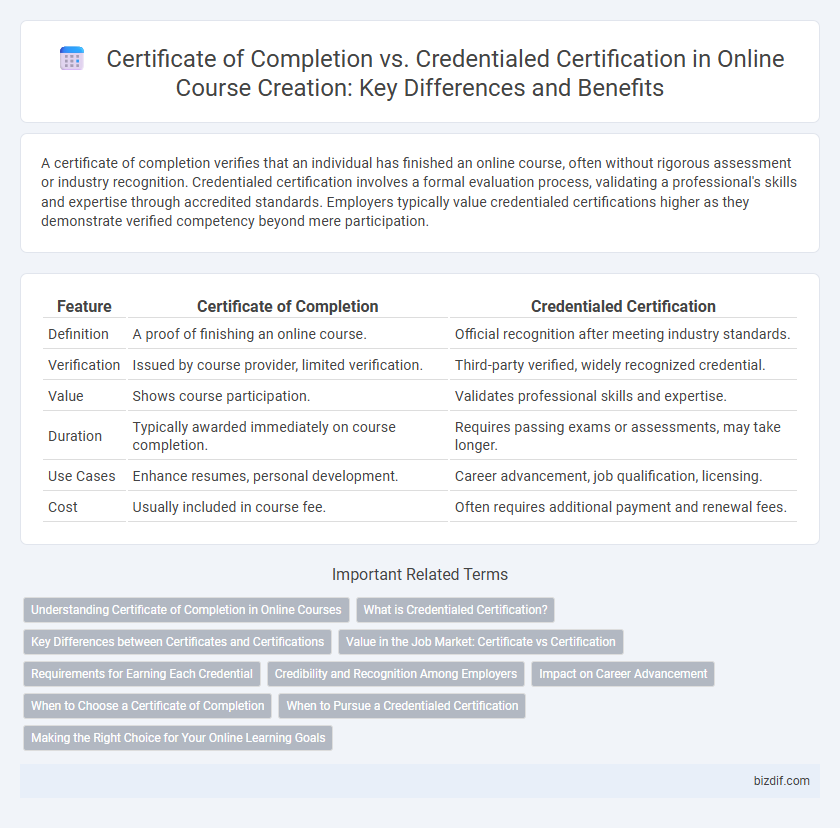A certificate of completion verifies that an individual has finished an online course, often without rigorous assessment or industry recognition. Credentialed certification involves a formal evaluation process, validating a professional's skills and expertise through accredited standards. Employers typically value credentialed certifications higher as they demonstrate verified competency beyond mere participation.
Table of Comparison
| Feature | Certificate of Completion | Credentialed Certification |
|---|---|---|
| Definition | A proof of finishing an online course. | Official recognition after meeting industry standards. |
| Verification | Issued by course provider, limited verification. | Third-party verified, widely recognized credential. |
| Value | Shows course participation. | Validates professional skills and expertise. |
| Duration | Typically awarded immediately on course completion. | Requires passing exams or assessments, may take longer. |
| Use Cases | Enhance resumes, personal development. | Career advancement, job qualification, licensing. |
| Cost | Usually included in course fee. | Often requires additional payment and renewal fees. |
Understanding Certificate of Completion in Online Courses
A Certificate of Completion in online courses signifies that a learner has successfully finished the program and met its basic requirements, but it does not carry the same professional recognition as a credentialed certification. These certificates serve as proof of participation and knowledge acquisition rather than mastery or competency validated by an accredited institution. Employers and professionals often prioritize credentialed certifications that involve rigorous assessments and industry standards over simple certificates of completion.
What is Credentialed Certification?
Credentialed certification is a formal recognition granted by an accredited professional organization or governing body, verifying that an individual has met specific industry standards and demonstrated expertise through rigorous assessments. Unlike a certificate of completion, which simply confirms course attendance or participation, credentialed certifications often require ongoing education and periodic renewal to ensure up-to-date knowledge and skills. This type of certification enhances career credibility, improves job prospects, and may be mandatory for certain regulated professions.
Key Differences between Certificates and Certifications
Certificates of completion verify that a learner has finished an online course, often without standardized testing, and are primarily used to demonstrate participation or skill acquisition. Credentialed certifications require passing rigorous assessments and are recognized by professional bodies, validating specific competencies and expertise in a field. Employers typically value credentialed certifications higher as they indicate verified proficiency, whereas certificates serve as proof of learning progress or continuing education.
Value in the Job Market: Certificate vs Certification
Certificates of completion demonstrate the successful finishing of an online course but often lack formal recognition in professional settings. Credentialed certifications are accredited by recognized industry bodies, providing verified proof of skills and knowledge that employers value highly in the job market. Hiring managers prioritize credentialed certifications over certificates due to their rigorous assessment standards and relevance to job performance.
Requirements for Earning Each Credential
Earning a certificate of completion typically requires finishing all course modules and passing any final assessments, demonstrating basic comprehension of the material. Credentialed certification demands meeting more rigorous standards such as proctored exams, verified identity, and often prerequisites like prior experience or education. These credentialed certifications validate professional competency and are recognized by industry organizations and employers.
Credibility and Recognition Among Employers
A credentialed certification from accredited institutions holds greater credibility and is widely recognized by employers compared to a certificate of completion, which mainly signifies participation or course completion. Employers often prioritize credentialed certifications as they demonstrate verified skills and knowledge aligned with industry standards. This distinction impacts job prospects, salary potential, and professional growth opportunities.
Impact on Career Advancement
Certificate of completion typically demonstrates the successful conclusion of an online course, providing proof of learning but often lacks industry recognition. Credentialed certifications, issued by accredited organizations or professional bodies, carry significant weight in hiring decisions and career advancement due to their validation of expertise and skills. Employers prioritize credentialed certifications over certificates of completion when evaluating candidates for promotions or specialized roles.
When to Choose a Certificate of Completion
A Certificate of Completion is ideal for learners seeking recognition of course participation without the rigorous assessment requirements linked to credentialed certifications. This option suits skill-building courses, professional development workshops, or personal enrichment classes where formal qualifications are not mandatory. Choose a Certificate of Completion when the goal is to acknowledge attendance and effort rather than provide a verified professional credential.
When to Pursue a Credentialed Certification
Pursuing a credentialed certification is essential when aiming to validate specialized skills and knowledge recognized by industry standards or professional bodies, boosting credibility and career advancement. Certificate of completion signifies participation or mastery of course content but lacks the formal recognition and rigor associated with credentialed certifications. Opt for a credentialed certification when the goal is to meet employer requirements, comply with regulatory demands, or enhance professional qualifications in competitive job markets.
Making the Right Choice for Your Online Learning Goals
A certificate of completion verifies participation and course completion without external validation, making it ideal for personal development and skill enhancement. Credentialed certification involves third-party accreditation and rigorous assessments, providing recognized qualifications that enhance professional credibility. Selecting between these depends on your career objectives: choose certificates for flexibility and foundational skills, credentialed certifications for formal recognition and career advancement.
Certificate of completion vs Credentialed certification Infographic

 bizdif.com
bizdif.com